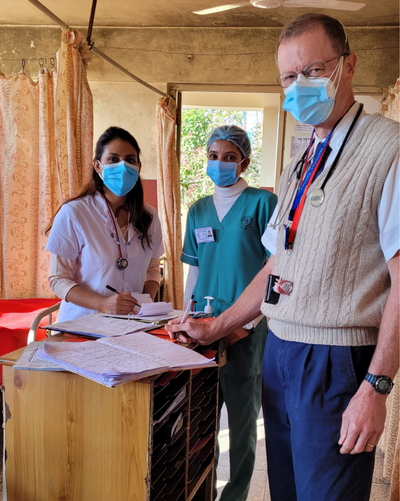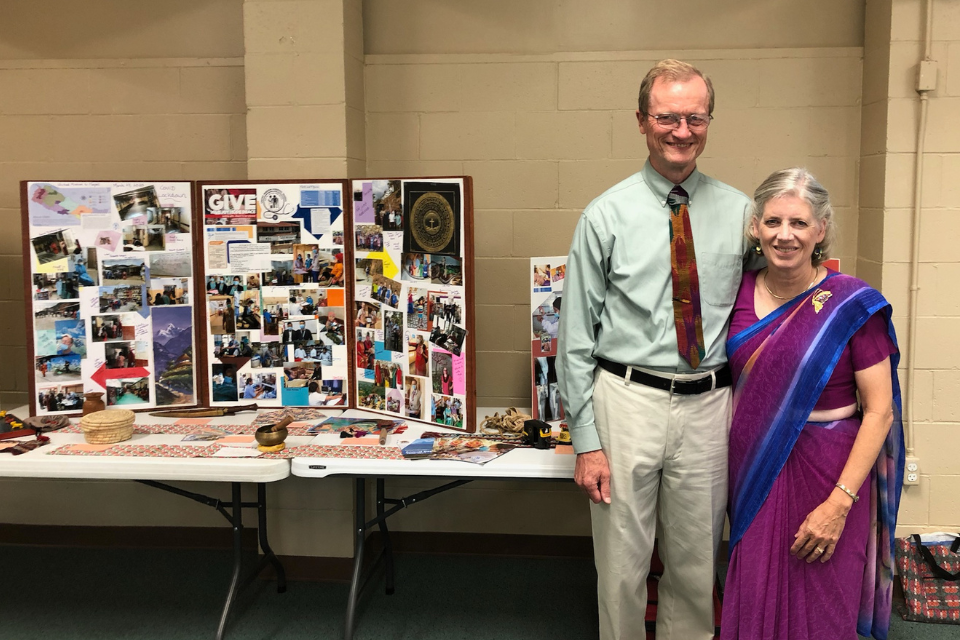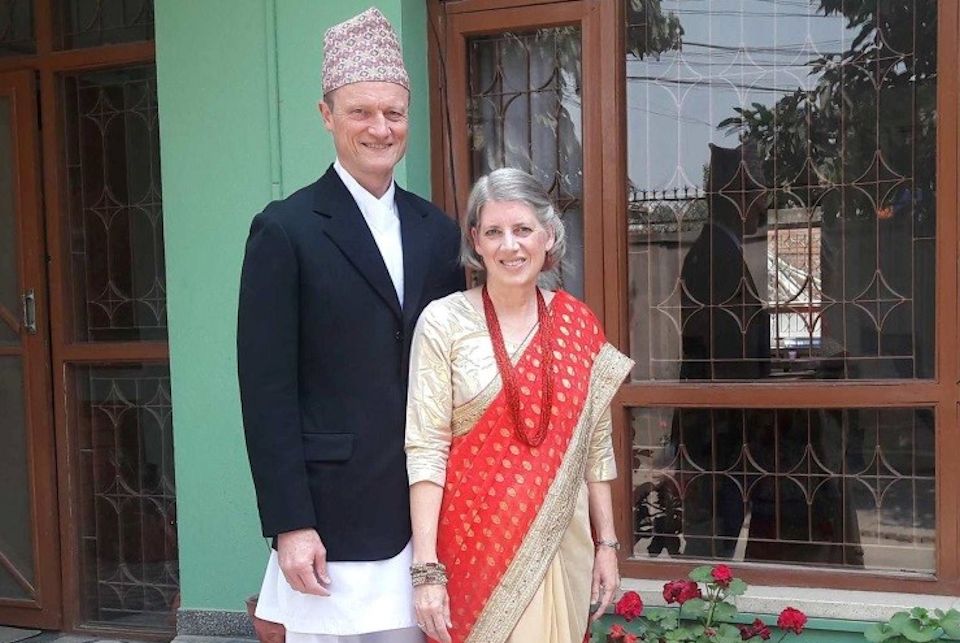STEP FIVE: Dr. Lester and Debbie Dornon are the first missionaries to visit the Michigan Conference since the beginning of the pandemic. Seven churches welcomed these EngageMI Mission Partners from Nepal.
JAMES DEATON
Content Editor
Seven Michigan United Methodist congregations welcomed Deborah and Lester Dornon, longtime EngageMI mission personnel serving in Nepal, during the month of July for a time of reconnecting face-to-face and mutual encouragement. They had returned to the United States in May to visit with supporting churches in the Midwest and catch up with friends and family.
The Dornons are missionaries with the General Board of Global Ministries (GBGM) at a rural mission hospital in Nepal that primarily serves individuals who cannot afford healthcare. They are the first missionaries the Michigan Conference has received for an itineration visit since the COVID-19 pandemic began in early 2020 and travel restrictions were put in place.
Around 200 Michigan United Methodists saw the Dornons in person give updates about their ministry in Nepal. More watched via video as some congregations provided online alternatives, in the hopes of broadening support in this new phase of the pandemic as hybrid methods become the norm. In response to these visits, relationships with churches continue to be strengthened and friendships are reinvigorated.
The seven United Methodist congregations on this tour included the following, in the order visited: Grand Haven: Church of the Dunes UMC; Sodus: Chapel Hill UMC; Centreville UMC; Clarkston UMC; Shepherd UMC; Lowell UMC; and Lake Harbor UMC in Norton Shores. This was the Dornons’ third visit to Michigan churches, the other two visits being in 2015 and 2019.

Dr. Lester Dornon and Deborah Dornon are GBGM missionaries at Tansen Hospital of the United Mission to Nepal. The hospital has over 400 staff members, 169 beds, nearly 89,000 outpatient visits, and over 11,000 inpatient admissions. The United Mission to Nepal, established in 1954, is a partnership between the people of Nepal and a coalition of 20 Christian organizations on four continents. Les and Debbie returned to Nepal and Tansen as missionaries in mid-2012, having served there previously from 1990 to 2002.
Les is assigned as a family physician whose work is divided between clinical responsibilities at all levels of inpatient and outpatient care, except for surgery, and teaching. For the past three years, he has been the coordinator for the training of new doctors in the hospital as well as paramedical staff who are on training courses sent by the Nepali government from rural health posts, along with midwives.
Debbie is assigned as coordinator of expatriate services at Tansen Hospital. She helps shepherd missionary personnel and their families through the application process, pointing them to the necessary resources for moving to Nepal, arranging housing, and then helping them settle in once they arrive. This behind-the-scenes ministry is a vital supportive role to the missionary community working at the hospital.
Missionaries like the Dornons come back to their home countries on a regular basis, typically for three months, to renew their relationships with congregations and individuals who sustain their work through prayer and financial support. But the COVID-19 pandemic stopped nearly all itinerating missionary visits to the United States for two years. And so, everyone was pressed to learn new methods of staying connected to one another.
Audra Hudson, Michigan Conference Secretary for Global Ministries, helped coordinate the Dornons visit to the Great Lakes State, and understands the challenging situation missionaries have faced and the creative solutions that had to be developed when no travel was possible.
“In an effort to maintain connection amidst this crisis,” noted Hudson, “the General Board of Global Ministries, our conference, and missionaries themselves imagined new ways to safely share stories and the work of peace and justice in our world. Videos, livestreamed panels, newsletters, and other creative storytelling methods kept church partners informed and engaged in global mission.”
The Dornons and other missionaries have utilized these methods to keep churches connected to God’s work around the world,. And even though the way missionaries communicate with their supporting congregations has evolved, there is still great value in face-to-face conversations and being able to reconnect with one another in person.
GBGM is still not permitting a regular home assignment schedule for missionaries, and so the Dornons had to receive special permission from the board for a three-month visit. The board provided safety guidelines for meeting with churches in person, and they were only permitted to visit churches they could drive to from their home base in Indiana. So, on this trip the Dornons were not able to visit churches in California and Hawaii that continue to support them.
Visiting supporting congregations is important to the vitality of missionary work and life. And the Dornons reiterated this fact as they reflected on their recent trip to churches in the Midwest, including their July visit to Michigan.
There are several reasons why the Dornons feel these visits are so valuable. First of all, it’s a good way to garner prayer support for the mission work, something missionaries have done for centuries dating back to the days of the apostle Paul and his journeys. Plus, being able to see the faces of those who care for us has tremendous value. As we’ve all experienced during the pandemic, there’s a longing to be together with other human beings, even if we are wearing a mask, and this is true for missionaries as well. Some of the people the Dornons visited have supported them for years, and so it has been nice to see these familiar faces in person.
On the financial side of things, visits to churches are a way to give some sense of accountability, to show people how the money they are giving is being used. The Dornons have also noticed that allowing church members to see and hear them, even via video, has a greater potential for encouraging new people to financially support their mission work. Debbie said, “We have found that if people actually . . . have met a missionary who’s in some project, then they are more likely to give to support that project. If you . . . haven’t had any contact with anyone and you just get an email or a letter in the mail, you may not be as willing to give.”
One final benefit of these visits has been the ability to tell the stories of God’s love in action in another part of the world. The Dornons admit that it’s easy for us here in the United States to forget what life is like in other places. So, it’s important to keep the Tansen Hospital and the ministry they have in Nepal front and center in their presentations and speeches.
Debbie confessed, “We feel strongly that the work of the hospital where we are is still very important, especially the fact that we serve people who can’t afford to go anywhere else and who are turned away from other hospitals because they can’t pay.”

The Michigan churches the Dornons visited last month felt connections were deepened by this in-person visit as they gave updates on how they and Tansen Hospital have been weathering the pandemic in such a remote area of the world. Restrictions prevented travel, which reduced the number of expatriates connected with the hospital from 40 or 50 to about 10 or 12. Those same restrictions, along with anxiety and fear of possibly being exposed to the virus in crowded spaces, prevented some patients from coming to the hospital to get treated.
Rev. Brad Brillhart, pastor of Lowell UMC, said, “Their message was encouraging and hopeful. It was also interesting to hear how others have struggled through COVID-19, and it has helped us to realize our commonality as human beings in that struggle.”
Seeing photos and hearing stories help to humanize a situation, but the work done through the Dornons is quite extraordinary. Lonely people find community. Illnesses are treated and healing comes. The financial burden of paying for healthcare is erased. Jill McMahon, Missions Chairperson at Lake Harbor UMC in Norton Shores, saw the hand of God through the Dornons’ witness: “While Les and Debbie look and act like you and me, the stories they shared of their work and relationships certainly proved that missionaries are indeed superheroes!”
Les and Debbie’s faith in God and their relationships with the people of Nepal and those who work at the Tansen Hospital are what has carried them through the pandemic. And it is what has buoyed them over the many years they have served as missionaries. Brenda DuPree, who hosted their visit to Clarkston UMC, heard this while spending time with the Dornons: “They have humbly asked God to place them where they are needed, to use their talents and skills and to guide them on this journey. They have spent 22 years there and have become one with the people, loving them, being in family together.”
Even though they have given much of their lives to God’s work among the people of Nepal, it’s been very difficult being away from their families, especially more recently with the arrival of their grandchildren. The first one was born in 2016.
So, now that their three-month home assignment is complete, the Dornons have decided to take a six-month leave of absence staying in Indiana with Debbie’s parents, who are getting older and need additional care. Plus, their son and his family live nearby in Zeeland, MI. At the end of this year, they’re going to decide whether they will return to Nepal permanently. They will probably go back, but they are in prayerful discernment as they determine God’s leading.
Global missionaries like the Dornons have been part of The United Methodist Church’s connectional life for many years. Rev. Mary Ivanov celebrated the richness of this bond when she reflected on their visit to Lake Harbor UMC: “Missionary work is highly contextual and requires connections and support. . . .[The Dornons’] work and witness on our behalf is a powerful part of our global connection.”
Les and Debbie Dornon are EngageMI missionaries supported by our conference. Congregations and individuals wanting to support their work can submit a check to the Michigan Conference at 1161 East Clark Road, Suite 212, DeWitt MI 48820. For Les, write this phrase in the memo line: “General Advance #10919Z.” For Debbie, it’s “General Advance #10920Z.”
Learn more about Tansen Hospital by reading the latest issue of the hospital’s magazine, which provides powerful stories of love in action. Additional stories are found on Les and Debbie’s blog.

